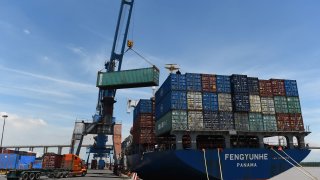
- Cort is experiencing delays and costly inflation at every stage in its supply chain.
- Its shipments have been months behind schedule amid delays at ports and competition for products.
- Shipping capacity that was already limited has been impacted by the resurgence of Covid cases as the highly contagious delta variant spreads.
Furniture rental company Cort is jumping through hoops to manage supply-chain delays and a sharp rise in shipping costs it began facing last year as the coronavirus pandemic gripped the world.
To avoid the difficulty in finding available shipping containers to lease, it bought 100 so it could get its couches, beds and bar stools to the United States. The company imports from seven countries, but it is adding even more, including Mexico, and sourcing more products domestically.
To bypass the traffic buildup at the Port of Los Angeles, Cort has turned to other ports to bring in its desks, office chairs and book cases.
We're making it easier for you to find stories that matter with our new newsletter — The 4Front. Sign up here and get news that is important for you to your inbox.
"In my time in business, I've never seen anything that resembled it. Typically, if there's part of the supply chain that has an issue, it's in one part of the supply chain. Here we're seeing literally across the board over the last couple of months," said Cort Executive Vice President Mark Koepsell.
Products that took 30 to 45 days to receive, now take seven to eight months, Koepsell said.
"Issues are everything from finding space on a ship coming out of Asia, to getting the ship across the sea and through the Port of Los Angeles, which is stacked up anywhere between seven and 14 days deep with freighters going down the coast," Koepsell said.
Money Report
Cort, owned by Berkshire Hathaway, usually has hundreds of millions of dollars worth of furniture in storage at any given time. Furniture for its busy season normally arrives by late March to early April.
"We buy on a regular cycle every year that tends to coincide with, at least on the residential side, deliveries that will support the relocation season. And that season generally starts in March and goes through September, October," Koepsell said.
This year, it barely had any of its 170 containers delivered by April.
"In terms of trying to get a container on board, it took both more time and it took a lot more money than what it has in the past," Koepsell said. "At the beginning of June, we had 20 of them in. [By the end of July, we] got probably north of 100 in and we're expecting all of them to be in by the end of August."
Unlike a furniture retailer, Cort services people who are relocating domestically and deciding to not take all their belongings with them, or those who are moving internationally and temporarily need furnishing for a set time frame or until their belongings arrive. Cort works with corporations, relocation management companies and at the individual level.
Cort would not reveal its annual revenue, but the industry had $5.8 billion in sales in 2019, according to Kentley Insights' 2021 Party and Furniture Rental Market Research Report.
The company keeps its furniture in use for a few years before selling it at its clearance centers or to groups involved in supportive housing projects.
Koepsell oversees the company's work with relocation management companies domestically and around the world and the company's higher education and military service businesses.
With delays in many peoples' plans to relocate, Cort was lucky that its busy season coincided with people's moving plans.
While many people moved last year, especially young professionals, according to Cort, corporate-sponsored relocations declined by 40% to 60% in 2020, with the largest drops in international relocations. That business is just beginning to pick up again.
"What typically would have happened in March, April or May has been pushed back. And so the furniture is arriving at the same time that the season is expected to be picking up, so we were fortunate in that respect," Koepsell said.
But the shipping delays meant that the company does not have the diverse selection it usually does, limiting customers' options.
Inventory is further constrained by tight container availability, with ports in Asia remaining congested and ocean freight rates reaching record highs, according to Everstream Analytics.
Container shortages partly stem from reduced manpower, resulting in them not being returned, according to Koepsell. So even when there have been openings on ships that Cort can take advantage of, those ships have not had containers available for the company to lease.
Shipping companies have been trying to ease the bottlenecks by returning containers to Asia faster, and that often means empty, so they can get finished products back to the States. But that means American raw goods, some of which are essential for the production of furniture, are not getting shipped from the U.S. to factories overseas — disrupting the supply chain even further.
The cost to ship containers overseas has also shot up to astronomically high levels.
"We were paying maybe $1,500 a container to get from Asia to Los Angeles in the past. That price is now up to $17,000, and if you want it rushed, there's another $3,000 to $5,000 on top of that," Koepsell said.
"You can avoid the delays by paying exorbitant prices. I mean, we've heard of containers costing $30,000 to ship for somebody that needed it within four weeks."
To offset inflation, Cort has raised prices on its products, with no sense of how long the cost increases will last.
With the price of getting a container shooting up to $20,000, the cost of a sofa goes up $200, Koepsell said.
"I'm not sure if it's temporary or permanent. But I don't believe it's ever going to go back to where it was. Whether it continues to grow at the rate it is, that's to be determined."
Big-box retailers
As the pandemic took hold, the furniture industry began to experience an increase in demand from consumers who were stuck at home and decided to renovate or improve their homes. Many of these consumers were using retailers like Wayfair as well as big-box retailers including Costco, Walmart and Target, creating heightened competition for companies like Cort.
"A lot of the manufacturing was redirected towards those groups, and even though we had contracts in place, it was difficult to get the full commitment that we have been promised. This is with longtime vendors — they were just out of capacity and they were also going through their own issues in handling Covid in their countries," Koepsell said.
These retailers were taking up a larger portion of furniture shipments as they stocked up their warehouses. This drove up furniture shipments by a factor of 300%, despite orders increasing by only 25%.
"For those companies to provide the level of fulfillment that they promised, they have been among the early orderers, and they basically took up most of the production out of the Asian countries … from June-July of 2020 till now to stock their warehouses," Koepsell said. There is some overlap between Cort and these retailers — in some cases the company is buying products from manufacturers who are also selling to big-box retailers.
Most of the goods Cort gets out of Asia are from China and Vietnam, which are experiencing resurgences in Covid cases that could lead to further product delays. The rise in infections is largely due to the spread of the highly contagious delta variant and has led to more restrictions limiting factory production or shutting them down.
While some factories in Vietnam have resumed operations, most remain shut as restrictions require factories to guarantee workers can work, eat and sleep within the plants and isolate from the public, said Mirko Woitzik, senior manager of risk intelligence solutions at Everstream Analytics. Apart from the largest companies, it seems that most factories are unable to do this, significantly reducing capacity.
"I don't see things getting better, especially in Vietnam, but also in Malaysia, like just looking at the Covid-19 cases," said Neza Kricaj, intelligence solutions consultant at Everstream Analytics
Malaysia's most severe lockdown restrictions ended in mid-July, but Covid restrictions that remain in place are preventing manufacturing sectors from operating at full capacity.
Congestion at ports in Malaysia also continue with container ships waiting an average of two days.
Last week, Port Cat Lai in Vietnam stopped receiving some imports until at least Monday due to a container pileup caused by employee and truck shortages.
"Vietnam's ports face unprecedented congestion levels due to businesses that have remained closed for weeks not picking up import containers at the ports, causing huge backlogs. In particular, the Port of Cat Lai in Ho Chi Minh City has experienced disruption that have been compounded by labor shortages, causing port operators to stop accepting certain import shipments until Aug. 16," Woitzik said.
The future
"Getting household goods around the world is tremendously difficult. It used to be a six-to-eight-week process, max. And right now, we're talking with people that are four to six months in, without having any idea of where the product is," Koepsell said.
It remains to be seen how long these supply-chain disruptions will last.
"At some point the supply chain will come back to some type of equilibrium. Will it go back to the prices that we had in 2019? Probably not. They may be 1½, two times what they were, but that will still be hugely, hugely less than the increases that we've seen today," Koepsell said.






